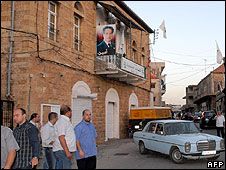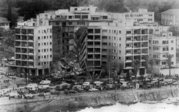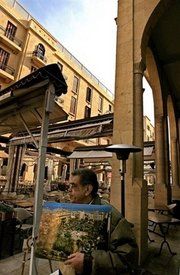 Two members of the Christian Phalange Party in Lebanon have been shot dead at the opening of a new office in the town of Zahle. It is not clear who was behind Sunday’s shooting, which injured three others. The Lebanese army has been heavily deployed in the town, and funerals are to be held on Tuesday.
Two members of the Christian Phalange Party in Lebanon have been shot dead at the opening of a new office in the town of Zahle. It is not clear who was behind Sunday’s shooting, which injured three others. The Lebanese army has been heavily deployed in the town, and funerals are to be held on Tuesday.
Zahle, Lebanon – The town of Zahle, eastern Lebanon, was gripped Monday by tension as residents observed a day of mourning following the deadly shooting of two Christian Phalange party members a day earlier. The funerals for Nasri al-Maroni and Salim Assi, who were shot dead by gunmen on Sunday while inaugurating a new office for their party in Zahle, have been scheduled for Tuesday. According to initial police investigations, one of the gunmen was identified as Joseph Zouki. Police said they had launched a manhunt for him. He is believed to be a supporter of Zahle MP Elie Skaff, a Christian who backs the pro- Syrian opposition. Security sources in Zahle said that they were also looking for Zouki’s brother, Toni, whom they suspect was with him at the time of the shooting. Police sources said Monday Walid Zouki, a relative of Joseph, had surrendered to police. While Walid was not a prime suspect, "he had some role" in the crime, they added.
Phalange leader and former president Amin Gemayel called the incident a "premeditated act" to incite civil strife and held "the leaders of the opposition responsible." The former president’s son Sami Gemayel had just left the inauguration at the time of the shooting. Gemayel’s son Pierre, former industry minister and also an MP, was assassinated in November 2006. MP Elie Skaff, whom the assailants support, rejected Gemayel’s accusations and said his men were attacked by the Phalange party members first. This was an "isolated act", he said that he would "not provide protection for the assailants," adding, "I would say the incident took place as a self-defence act." Meanwhile, security was tight as police had set up checkpoints across the town and searched the homes of suspected assailants.
 By Zeina Daccache, Two condemned prisoners residing in a high security Lebanese prison and participating in the drama therapy sessions taking place inside the facility since February 2008 recently described their experiences with the following metaphors: "Prison is a microcosm of the outside world; it holds all kind of people, from differing religious communities and from differing regions throughout Lebanon and consequently belonging to different political parties. In prison, absurdly as it sounds, one learns how to reconcile with the other before returning to the biggest prison: the Lebanese society, (IF, we ever return to it)" – E.F., a Lebanese Christian from Mount Lebanon.
By Zeina Daccache, Two condemned prisoners residing in a high security Lebanese prison and participating in the drama therapy sessions taking place inside the facility since February 2008 recently described their experiences with the following metaphors: "Prison is a microcosm of the outside world; it holds all kind of people, from differing religious communities and from differing regions throughout Lebanon and consequently belonging to different political parties. In prison, absurdly as it sounds, one learns how to reconcile with the other before returning to the biggest prison: the Lebanese society, (IF, we ever return to it)" – E.F., a Lebanese Christian from Mount Lebanon.  WASHINGTON (AFP) – Secretary of State Condoleezza Rice on Friday joined fellow US diplomats in marking the 25th anniversary of the bombing at the US embassy Beirut which killed 52 people on April 18, 1983. "Even when the tragedy of April 18 was followed by further attacks on our Marine barracks later that year, on our embassy annex in 1984, and still others beyond that, the terrorists never broke our will," Rice said during a ceremony at the State Department. "It is in continuing to champion the cause of a democratic Lebanon that we pay greatest honor to those who died and those who suffered on that day." The attack by the Islamic Jihad Organization, which US officials have said was a forerunner of Hezbollah the Iranian- and Syrian-backed Shiite militia, was at the time the deadliest attack ever on a US diplomatic mission.
WASHINGTON (AFP) – Secretary of State Condoleezza Rice on Friday joined fellow US diplomats in marking the 25th anniversary of the bombing at the US embassy Beirut which killed 52 people on April 18, 1983. "Even when the tragedy of April 18 was followed by further attacks on our Marine barracks later that year, on our embassy annex in 1984, and still others beyond that, the terrorists never broke our will," Rice said during a ceremony at the State Department. "It is in continuing to champion the cause of a democratic Lebanon that we pay greatest honor to those who died and those who suffered on that day." The attack by the Islamic Jihad Organization, which US officials have said was a forerunner of Hezbollah the Iranian- and Syrian-backed Shiite militia, was at the time the deadliest attack ever on a US diplomatic mission. Thu Apr 17, 8:35 PM ET , WASHINGTON (AFP) – US President George W Bush on Thursday accused Iran and Syria of undermining democracy in Lebanon and renewed his support for the embattled government of Prime Minister Fuad Siniora. The United States will continue to stand with the Lebanese government and the Lebanese people as they struggle to preserve their hard-won sovereignty and independence, endeavor to provide justice for victims of terrorism and political violence, and continue to seek the election of a president committed to these principles," Bush said in a written statement.
Thu Apr 17, 8:35 PM ET , WASHINGTON (AFP) – US President George W Bush on Thursday accused Iran and Syria of undermining democracy in Lebanon and renewed his support for the embattled government of Prime Minister Fuad Siniora. The United States will continue to stand with the Lebanese government and the Lebanese people as they struggle to preserve their hard-won sovereignty and independence, endeavor to provide justice for victims of terrorism and political violence, and continue to seek the election of a president committed to these principles," Bush said in a written statement. by Rita Daou, BEIRUT (AFP) – Loretta Beayni works 10 hours a day, six days a week in a Beirut beauty salon, earning a mere 400 dollars a month, which goes in the blink of an eye on household bills and helping out her parents. Like many Lebanese, she has a hard time making ends meet in a country where inflation is hefty and where many are forced to take on two jobs to survive.
by Rita Daou, BEIRUT (AFP) – Loretta Beayni works 10 hours a day, six days a week in a Beirut beauty salon, earning a mere 400 dollars a month, which goes in the blink of an eye on household bills and helping out her parents. Like many Lebanese, she has a hard time making ends meet in a country where inflation is hefty and where many are forced to take on two jobs to survive.


